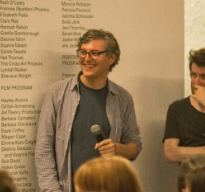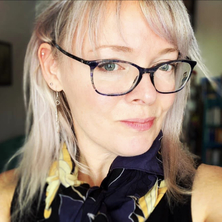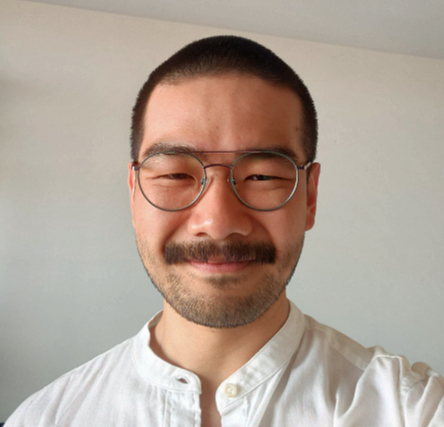Artificial Visionaries: Exploring the intersections of machine vision, computation, and our aural and visual cultures
As artificial intelligence and generative technologies become entangled with our day-to-day creative practices and industrial forms of cultural production, it prompts critical reflection on the affordances, differences, and points of connection between human perception and machine vision, human labour and machine labour, and human creativity and computational creativity. How are generative technologies being incorporated into our creative practices? How are data and algorithms influencing the way we make, exhibit, distribute, perceive, or consume art?
ChatGPT suggested we call this event "artificial visionaries" — so we did. But who are the visionaries? The hallucinations of the machines, or the creative visions (and hallucinations) of the humans who use them? Whilst the phrase may bring to mind questions of authenticity, authorship, or aesthetic judgement for some cultural studies scholars, we're sure it will prompt very different ideas for a computational scientist. We feel that the polysemy of a machine-generated term such as this is also representative of the many different approaches scholars are taking toward digital cultural research.
"Artificial Visionaries" is a two-day symposium with the goal of bringing together scholars who are exploring the intersections between computation and creativity across a broad range of aural and visual cultures. We welcome researchers, practitioners, and artists exploring the relationship between data, machine vision, digital platforms, algorithms, generative technologies, and the following aural and visual cultures:
- music
- podcasting and audiobooks
- fine arts
- film and television
- museum studies
- graphic design
- video games
- content creation
- digital advertising
We invite researchers and practitioners to submit abstracts for short papers – roughly 10-15 minutes – exploring the ways in which these new technologies, machines, and algorithmic cultures are disrupting, displacing, or reconfiguring forms of cultural production. We encourage critical reflection on, and interrogation of, these increasingly complex interactions between computation, creativity, and culture. What are the aesthetic, social, economic, or cultural implications of our evolving creative practices? We also strongly encourage alternative and creative submissions that explore these themes.
Each day will include a keynote presentation in the morning, followed by a series of lighting talks from our participants, and a computational workshop in the afternoon.
Travel awards (HDR Students and ECRs)
Travel funding for HDR students and ECRs in the ADM+S is available on a competitive basis. Please contact us if you are a member of the ADM+S and would like to be considered for subsidised travel.
Keynote speakers
Dr Joel Stern (RMIT)
 Dr Joel Stern is a researcher, curator, and artist living in Naarm/Melbourne, Australia. He holds the position of Vice-Chancellor’s Postdoctoral Fellow at the School of Media and Communication, RMIT University. Informed by a background in experimental music and sonic art, Stern’s work focusses on how practices of sound and listening inform and shape our contemporary worlds.
Dr Joel Stern is a researcher, curator, and artist living in Naarm/Melbourne, Australia. He holds the position of Vice-Chancellor’s Postdoctoral Fellow at the School of Media and Communication, RMIT University. Informed by a background in experimental music and sonic art, Stern’s work focusses on how practices of sound and listening inform and shape our contemporary worlds.
In 2020, with fellow artist-researchers Sean Dockray and James Parker, Joel founded Machine Listening, a platform for collaborative research and artistic experimentation, focused on the political and aesthetic dimensions of the computation of sound and speech. Machine Listening emerged out of Stern’s previous work with James Parker on Eavesdropping, a multifaceted project staged at Ian Potter Museum of Art (University of Melbourne) and City Gallery (Wellington) addressing the capture and control of our sonic worlds, alongside strategies of resistance.
Between 2013 and 2022 Stern was Artistic Director of pioneering Australian organisation Liquid Architecture, helping establish it as one of the worlds leading forums for sonic art. In this capacity he curated and produced numerous festivals, exhibitions, concerts and publications in Australia and internationally, while developing artistic research investigations including disorganising, Polyphonic Social, Why Listen?, Instrument Builders Project, and Ritual Community Music.
Dr Lisa Bode (UQ)
 Lisa Bode lectures in Film and Television Studies at the University of Queensland. She is the author of Making Believe: Screen Performance and Special Effects in Popular Cinema (Rutgers University Press, 2017), which historicizes screen performance within the context of visual and special effects cinema and technological change in Hollywood filmmaking, through the silent, early sound, and current digital eras, in order to shed light on the ways that digital filmmaking processes such as motion capture, digital face-replacement, and green-screen acting are impacting screen acting and stardom. She has published work in edited collections and journals on the implications of digital filmmaking technologies for synthetic media; screen acting and stardom, the cultural reception of the synthespian, mock documentary performance, and the processes through which dead Hollywood stars are remembered, forgotten, or re-animated. She co-edited the August 2021 special issue of Convergence on Digital Faces and Deepfakes on screen, and is currently writing a monograph for Rutgers University Press called Deepfakes and Digital Bodies.
Lisa Bode lectures in Film and Television Studies at the University of Queensland. She is the author of Making Believe: Screen Performance and Special Effects in Popular Cinema (Rutgers University Press, 2017), which historicizes screen performance within the context of visual and special effects cinema and technological change in Hollywood filmmaking, through the silent, early sound, and current digital eras, in order to shed light on the ways that digital filmmaking processes such as motion capture, digital face-replacement, and green-screen acting are impacting screen acting and stardom. She has published work in edited collections and journals on the implications of digital filmmaking technologies for synthetic media; screen acting and stardom, the cultural reception of the synthespian, mock documentary performance, and the processes through which dead Hollywood stars are remembered, forgotten, or re-animated. She co-edited the August 2021 special issue of Convergence on Digital Faces and Deepfakes on screen, and is currently writing a monograph for Rutgers University Press called Deepfakes and Digital Bodies.
She is on the editorial board for the series Animation: Key Films / Filmmakers (Bloomsbury Academic), and Animation Studies, the open-access peer-reviewed journal for The Society for Animation Studies. In 2020 she co-founded the Visual Effects Research Network with Associate Professor Leon Gurevitch.
Workshop Facilitators
William He (QUT)
 William He is a Machine Learning Engineer at QUT's GenAI lab, specializing in Large Language Model interpretability, model transparency, and emergent model abilities. His present work is a collaboration with Dr. Aaron Snoswell, Dr. Jean Burgess, and Dr. Damiano Spina on an LLM-powered social media re-ranking algorithm, which aims to reduce toxicity by reordering posts based on "bridging-ness". Their algorithm is currently a finalist in the Center for Human-compatible AI's Prosocial Ranking Challenge. Previously, William worked in the government sector, where he mostly trained and deployed Large Language Models in production environments and built proof-of-concept Retrieval Augmented LLMs and semantic search engines. William is also an independent filmmaker, with works that have been featured in previous editions of Canberra Short Film Festival, St Kilda Film Festival, and Melbourne WebFest, among others. He is currently in post-production on a feature-length documentary.
William He is a Machine Learning Engineer at QUT's GenAI lab, specializing in Large Language Model interpretability, model transparency, and emergent model abilities. His present work is a collaboration with Dr. Aaron Snoswell, Dr. Jean Burgess, and Dr. Damiano Spina on an LLM-powered social media re-ranking algorithm, which aims to reduce toxicity by reordering posts based on "bridging-ness". Their algorithm is currently a finalist in the Center for Human-compatible AI's Prosocial Ranking Challenge. Previously, William worked in the government sector, where he mostly trained and deployed Large Language Models in production environments and built proof-of-concept Retrieval Augmented LLMs and semantic search engines. William is also an independent filmmaker, with works that have been featured in previous editions of Canberra Short Film Festival, St Kilda Film Festival, and Melbourne WebFest, among others. He is currently in post-production on a feature-length documentary.
Event registration for attendees and speakers
Registration for attendees as well as speakers is free and will be opened on this webpage shortly after the program is finalised. Both attendees and speakers will need to register so we can adhere to dietary requirements and venue capacity.
This event is supported by The Centre for Digital Cultures & Societies at UQ and The ARC Centre of Excellence for Automated Decision Making and Society
To receive updates on this event, you can subscribe to The Centre for Digital Cultures & Societies newsletter here: https://ems.gs/3oBW0eZeNDb


